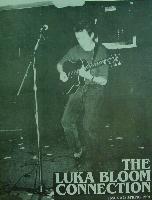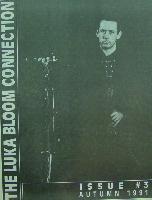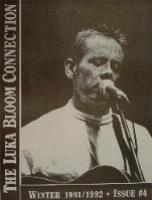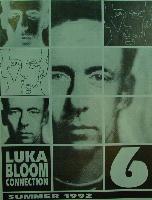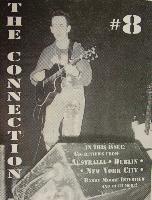Hello!
Welcome to #7! Many thanks for the kudos on the new look of the
Connection, and for the compliments on the cover design on the last issue.
All comments, good or otherwise, are always appreciated. Greetings also
go to everyone who has become part of the Connection since last time and
thanks to those who have participated. As always, your reviews, photos,
art work, classifieds, letters, etc., are welcomed.
I hope all of you had a great summer. For those of you in Europe,
I'm sure you especially enjoyed the many opportunities to see Luka since
the beginning of June right up through September. In early August, Luka
played the annual Feile in Thurles, Co. Tipperary. He then went on to
Belgium and Germany, playing at various outdoor festivals.
Moving on to the early part of autumn, on October 2nd, he headlined
at Dublin's National Stadium, along with The Frames and Russian gypsy-folk
band, Loyko. See inside for a review on that show. On the 4th, he pedaled
on north to Belfast, where he played at the Limelight.
October and early November found him playing mostly on the US west
coast, with one date in Canada, and three on the east coast, with
almost all the venues being of the small and intimate variety, at which I've
always felt Luka gives his most enjoyable and memorable performances.
On October 14th, he began his North American leg of the tour with a
Canadian show, at Vancouver's East Cultural Center. Then it was down
the coast a bit, into the US, for a show on the 15th at Backstage in
Seattle, WA. He played two shows in Oregon, one at RKCNDY in Portland
on the 16th, and another in Eugene, at Taylor's College Side Inn, on the
17th. Luka then stayed in California for a bit, playing first at New George's
in San Rafael on the 19th, then two shows at San Francisco's Great
American Music Hall on the 20th and 21st. On the 22nd he played in
Santa Cruz, at the Kuumbwa Jazz Center, then onto Davis, doing a
show at the Palms Playhouse on Friday, the 23rd.
Heading further down the coast, Luka played in Los Osos, at Sweet
Springs Saloon on the 24th, in West Hollywood's Troubadour on the
26th, at Bogart's in Long Beach on the 27th, The Belly-up Tavern in
Solana Beach on the 28th, and the Coach House on the 30th in San
Juan Capistrano. Luka ended his west coast series of shows with a gig
at McCabe's in Santa Monica on Hallowe'en (the 31st) - a definite treat!
Following that, Luka headed southeast for a couple of shows in
Georgia in the beginning of November; one in Athens on the 2nd at the
Variety Theatre, and another in Athens' Georgia Theatre in the 3rd. Luka
played one final American show in Trenton, New Jersey on November 4th.
Those of you who've been to these shows and would like to send in either
your local paper's reviews or one written by you personally, by all means,
do! I'll try to include as many as there's room for in the next issue.
By the time this reaches you, Luka will be in the land down under.
At press time, I have no itinerary for any confirmed Australian/New Zeeland
dates. Please contact your local music paper or radio station for
dates and venues.
Unfortunately, it's been the case where I'll receive confirmed touring
information after I've already gone to press. So, if any of you would like
to receive an updated itinerary (with dates AFTER this issue has already
been printed/mailed out), please send a self-addressed, stamped
envelope, asking for an itinerary. As soon as I get the info, I'll then
mail out the update to you.
Plans for Luka's new album, though still some time away, are
nevertheless in the works. It should be released some time in the coming
year. More details to follow as they become available.
A lot of you have asked about getting copies of Luka's earlier recordings,
as well as the Barry Moore "stuff" released before that.
I am pleased to tell you that there is a mail order company called
Tayberry Music, which specializes in traditional and contemporary
folk and acoustic recordings, that has in stock Luka's first album,
called Luka Bloom, on
Mystery Records (see further inside for a review). It's available in
cassette format only, and it sells for $12.50. They're still working on
locating the rest of the Luka/Barry Moore library, and I was told that
as soon as they hear of any other release made available, they'll
contact me...
On a sad note, Luka's mother passed away this past September.
Mrs. Moore was a much loved person by all who knew her, and she
played an important role in the musical influences in both Luka's and
Christy Moore's lives. She will be greatly missed. Heartfelt condolences
go out to both Luka and Christy, as well as all family members and
friends of the Moores.
That's it for now. As this issue has come out so late this year, I wish all
of you warm yuletide greetings and a prosperous 1993. Issue #8 should be
out some time in late winter/early spring. Until then, be well.
Peace and Love,
June
The following interview was taken from this past August's issue
of Bicycle Guide, where Luka was interviewed by the magazine's senior
editor Keith Mills, as part of their regular "The Last Word" column.
This interview was done back on April 26th, 1990 on KCRW, in California,
on a program called SNAP. Halled as one of LA's best shows, and according to the
staff there, the live version of "I Need Love" was a huge hit on the - the
most requested song the station ever had! Requests from newer Connection
subscribers who wanted a proper intro to Luka's background prompted me to
obtain this one. Special thanks to Betsy Brown, who made this interview available
for transcription.
Full Bloom
DEIRDRE: I'm Deirdre O'Donohue. I'm so happy to
have with me tonight, Luka Bloom, a man who is as well
noted in the press material as the first fellow from Ireland
since Van Morrison to be signed directly to a major label
here in the United States... Warner Brothers Records.
Since I first heard Riverside, I, along with many other people,
just fell head over heels for it. Solid, fine piece of work, Mr.
Bloom. And welcome to KCRW. Welcome back to America.
LUKA: It's great to be here, Deirdre.
DEIRDRE: You just got off the plane this afternoon, yeah?
LUKA: Just off the plane a couple of hours ago. I had a very
quick breakfast in Dublin at the ungodly hour of 7:30 this
morning. Took my last look at all the seagulled stuff on the
wall beside the Irish Sea where I live in Dublin and got in a
taxi and went to Dublin Airport and kissed the ground
and headed for Los Angeles and here I am, laughing
through the glass.
DEIRDRE: I can hear it. Well, I think it's appropriate that your
album begins with a laugh. A fine, hearty laugh. It definitely
sets the tone for it. Well, let's not talk. Let me get you to
sing. Luka Bloom.
LUKA: Hey! (and goes into a spirited version of
"You Couldn't Have Come At A Better Time")
DEIRDRE: What a fine way to start things. Indeed it is. You
couldn't have come at a better time. Luka Bloom is my guest
here tonight on SNAB and is going to be performing at
McCabe's, two shows, tomorrow night, the 27th. Now Luka Bloom
is not the name on your birth certificate. How did you come to
choose that name that the world would know you by, Luka?
LUKA Around about 1987, I decided I wanted a new identity.
An anonymous identity for my music. Nothing to do with
my real name, which is Barry Moore, or anyhing like that.
But I just wanted a new identity, because I knew I was going
to come to America and I wanted something different.
Something totally pretentious.
DEIRDRE: So where'd you get the parts from?
LUKA: Ah come on! It's pretty obvious, isn't it?
DEIRDRE: Well, I don't...
LUKA: It doesn't really matter. It has about as much meaning
as Sting or Iggy Pop or...
DEIRDRE: It's just for fun, then.
LUKA: Yeah.
DEIRDRE: Now when you came to America, if I've heard
this story correctly, you came to Washington, DC.
LUKA: Well, I initially came to NewYork, but I felt as
though... I felt sort of lost (laughs) as is prone to happen
to people when they land in that fair town. But I just wanted
to find a place where I could settle in a little bit and
get used to this new friend, America, and just take my
time about it. I felt that if I stayed in New York in the
beginning that I would maybe found myself going down yet
another couple of cul-de-sacs and so I decided to find
somewhere a little bit more quiet, where I could sort of control
my destiny a little bit. And so I chose the murder capital of
the US... (laughs quietly)
DEIRDRE: And what was it that made you want to come
and spend time here in America?
LUKA: I've always wanted to come to America, ever since I
was about 14 or 15 years of age and heard people like Doc
Watson play guitar. I've always wanted to come to America
but I never got it together. I never got enough money
together to pay for the fare, for a start. And then I was too
busy just roaming around Ireland and a little bit in
Europe to be really bothered about it. I didn't really take
what I was doing very seriously. And then I just made this
decision in the middle of the '80s to just go for it.
DEIRDRE: The time was right.
LUKA: Yeah.
DEIRDRE: You just chomp at certain moments. You trust
your instincts in those things. The time arrives and...
LUKA: It's not so much that you trust your instinct. In my
case it was more a question of desperation and wisdom
borne out of desperation.
DEIRDRE: How so? What was the desperation?
LUKA: Ah, it was just sort of... there's only so many times
you can play in Galway, do you know what I mean?
DEIRDRE: Not personally, but I can imagine...(both
laugh) Do you want to play another one here on SNAP?
LUKA: Yeah! Just give me a second to tune up Rudy, though.
DEIRDRE: Rudy's beautiful. Rudy's black. Is that solid?
LUKA No, it's not solid, no.
DEIRDRE: But Rudy will be there with Luka Bloom;
tomorrow night, at McCabe's.
LUKA: So will Nora.
DEIRDRE: Nora is...?
LUKA: Nora is the blue version of Rudy. Nora is Rudy's sister.
DEIRDRE: I can't imagine who she's named after...
LUKA: Yes you can...(after tuning up, Luka plays a beautiful,
stirring version of "Dreams In America")
DEIRDRE: You certain do bring a nice sense to this
country, Mr. Bloom. Beautiful.
LUKA: Thank you.
DEIRDRE: Thank you. What is it that you get from America,
and what is that you take from your lrish and pull together?
What are the strongest elements there, do you think?
LUKA: Serious questions going on there.
DEIRDRE: Shall I ask you a silly one? What's your favorite
color? What's your shoe size?
LUKA: (laughs)What do I get from America and what do
I take from Ireland, or what do I take from America and what
do I get from Ireland?... It really is... I suppose the first thing
that I encountered when I came to America is what has
since become one of my favorite words, which is attitude.
(laughs) That's probably the thing that has affected my
life more than anything else because some of the songs I
sing now I had written just before I came out here, but I
performed them with a certain lack of attitude, and as a result
of coming to America and experiencing the sort of hope
or optimism and enthusiasm that I encountered in my
shows on the east coast when I first came here, I cultivated
some of this attitude.You know, you pick up so much...
so many little things... so many tiny little things. It's not...
I can't define what it is I get from America. When people
ask me "what's America like?" at home, I always say it's
an impossible question to answer, because America isn't
any one thing... it's a multitude of things. Each city is a
multitude of things. That's my experience of it, anyway. And it
always... one of the things that really annoys me about home,
sometimes, is when people make generalizations about
America. I think people in Europe tend to do that. I meet
a lot of Americans who get a hard time when they go to
Europe because people in England and Ireland have a
very linear idea, a very one-dimensional idea of... when
they think of America, they think of Dallas or McDonald's
or of the sort of crasser side of corporate America. It's only
whenyou come here... I actually met a guy on the street in
Dublin yesterday, as it happens sometimes in Dublin. I
had a really heavy row with this guy on the street because I
told him I was coming back to America today, and he said,
"Oh, I'd never live there." And I said, "why wouldn't
you live in America?" and he said, "Oh, we've a much better
way of life over here," meaning Ireland, and I said, "How do you know?
Have you ever been there?" and he said, "No, I've never
been there... I just know..." and it really...y'know, I hate that
stuff! I just find there is so much to get from being in America.
DEIRDRE: Where did you grow up in Ireland?
LUKA: I grew up in a lovely little place (chuckles softly)
called Newbridge, County Kildare. A great little town to
grow up in as long as you get out of it when you're about 12.
DEIRDRE: So it was pretty much out in the country. It
wasn't an urban upbringing.
LUKA: It was very close to the city, but it felt... it was a totally
rural upbringing, yeah. Until I was 17 and then I moved to
Dublin. And I've lived in cities ever since.
DEIRDRE: Did you move to Dublin to go to school? Or just
to take off and start playing?
LUKA: (chuckles, then pauses) Both.
DEIRDRE: You were supposed to be going to school,
but you didn't...Yeah, right... I know that syndrome...
LUKA: You know that sort of nonsense. My life's ambition
was to be a second year student... and it still is!
DEIRDRE: (laughing) I think you're doing a fine job of it.
Would you like to sing another song for us, Luka?
LUKA: (in a mock Irish accent, laughing) Ah sure, now,
begobs and begorrah. Do you want one of my own or do you
want something different? Something from the record
or... what's your mood, Deirdre?
DEIRDRE: It's entirely up to you... changeable.
LUKA: Spring is in the air, isn't it?
DEIRDRE: Ah, it's wonderful right now.
LUKA: It's pretty amazing, actually.
DEIRDRE: It's nice out here, especially at the coast.
It's a little warmer inland. Want to do a spring song?
LUKA: I'm not just talking about the weather... it's sort of
the vibes... y'know what I mean? This is a spring type
song. (Luka breaks into "I Need Love")
DEIRDRE: (obviously impressed) The phones are
lighting up with candidates calling in, Luka!You just made
that song completely your own, didn't you?
LUKA: Well, I hope so. Well, no, not really completely my
own. It's just...
DEIRDRE: It's yours now. He may have written it, but...
LUKA: Well, it's just another way to do it. It's another
perspective...
DEIRDRE: When you first heard that song did you imagine
yourself doing a version of it that way?
LUKA: Yep.
DEIRDRE: Yeah? Right away?
LUKA: It was one of those things. I was actually seeking...
I wanted to learn a rap song because from living in
NewYork over the years I just... y'know, you're surrounded
by it so much, and it was such a new culture and a new
style of music for me to hear because you don't hear so
much rap except chart rap in Ireland, and so it was constantly
everywhere... ghetto blasters, cars... everywhere
you'd go. Initially it was very alien to me, but gradually it
got under my skin and I wanted to find a song that would
suit me, that I could work... that would work in my
set. I wouldn't do something like that just for the sake of
doing it, but when I came across that song, I felt that I
could do it in a way that it would work... that it would
make sense... it wouldn't just sound like an Irish guy trying
to be a rapper, or anything like that. It's sort of like poetry
in a way. I think it's a very beautiful song.
DEIRDRE: I think you've made it your own...that is
beautiful. Eat your heart out, LL Cooll!
LUKA: Don't say that!
DEIRDRE: (laughing) Ah, the typical Irish diffidence!
What shall I do with you? I shall ask you to play another
song. Luka Bloom is my guest tonight here on KCRW.
Riverside is the name of his album out on Reprise
Records. Tomorrow night, he's going to be doing
more of this for you at McCabe's.
LUKA: Yeah, lots more of it. Tomorrow night. I want to sing
a song for Paula Walker, because Paula Walker... I don't
know if she listens to this program, but she lives in Los
Angeles, and she directed the video which was for this next
song. It was very interesting... fantastic working with her
because I wasn't very excited about the idea of doing a video
because I'm more of a radio type person. I think radio is
much more, in some strange way, a much more direct way
to communicate with people... a much more meaningful
way to communicate with people, because there's no
distinction. It's just... it's very direct...and I like radio for that
reason. And I had this problem about doing a video until I saw
the video that she made for "Dirty Boulevard" for Lou
Reed. And she also did a very beautiful one for Gloria
Estefan... remember that lovely song, "I Don't Want To Lose
You Now"? And so, she came to Ireland, and she'd never
been there before and she... herself and Rolf her husband,
put together this video of this song... I'll sing it for you
now.. It's called "Rescue Mission". (Luka proceeds into
the song)
DEIRDRE: Now I want to see the video to that, having
watched you move through that and hearing what you had
to say. I like what you had to say about videos. I agree with
you. It's one of the reasons why I love radio. You leave all
of those elements to the imagination. It's not right that it
should be depicted. That's why I like doing it. That's why
I like having you here...Tomorrow night Senor Bloom
will be at McCabe's here in Santa Monica doing two
shows. Right now he's got Rudy, the black guitar with
him. And I guess Nora stayed home tonight?
LUKA: Well, Nora was a bit jet-lagged. Y'know, I opened up
the case and took a look in and y'know she was looking a little
bit like "I'm gonna give this one a miss tonight. Rudy's
more up to it."
DEIRDRE: Well, give her our regards. We'll see her tomorrow
night at McCabe's... I have instructions, orders, commands
and requests from a number of people... and I hope
that you're gonna be able to do this or I'm gonna be in
trouble... that we not allow you to leave the room unless and
until you play "Delirious" ...is that possible?
LUKA: (very enthusiastically)
Anything... anything is possible!
DEIRDRE: Ah, there's the Irish attitude! That's what I love!
Well, then, we'll have many hearts satisfied... hearts and
souls and ears...
LUKA: I'll do it on one condition.
DEIRDRE: What's that?
LUKA: That the sound engineer doesn't turn my guitar down!
DEIRDRE: (to her engineer)
Bob, don't you dare! (both laughing)
LUKA: You can take off a bunch of reverb and away we go!
I'm gonna sing this one for you, Deirdre, because I'm delirious
to be back in America. This is the opening performance of
my tour, you see.
DEIRDRE: It's a perfect place to start!
LUKA: I couldn't agree with you more. Hey! (and goes into a
rousing version of "Delirious")
DEIRDRE: (obviously delighted) Indeed! Luka Bloom is my
guest here tonight on KCRW and I could not be a happier
Deirdre O'Donohue. What a pro you are! You went right
through that, headphones flying off in the middle of
things... didn't miss a beat!
LUKA: They call it rock and roll, I suppose.
DEIRDRE: Y'know, I don't know what to call what you
do... other than glorious! I just love it! There's so many
different elements that you pull in, from American blues and folk,
hints of Irish traditional sort of senses and sounds. How do
you feel about music as it's happening in Ireland right
now? Do you feel heartened by it? Is it interesting?
LUKA: Very much so. Yeah, I do. I can't but because there's
always been lots of music in Ireland and I think that most
of... up until very recently, Irish music has been sort of introverted.
We're an island and we think very much like an island and that's
very attractive, because it means that the style is sort of distinctive.
Even the traditional music of Ireland is very different from
the traditional music of the rest of Europe. But the disadvantage
to that is that it's been very difficult for lrish music to
be accepted on an international stage. And in the last 10
or 12 years, more of that has been happening. People have
been coming out of Ireland, writing songs which have
been, I suppose loved really, all over the world. You know, U2
are the classic example of that. But there have been lots of
people...
DEIRDRE: Oh, I'd go back earlier... to Van Morrison...
LUKA: Well, yeah, sure... but I'm just saying as a supreme
example...
DEIRDRE: ...contemporary...
LUKA: ..in recent times, they would be... of course, people
like Van Morrison and Thin Lizzy, the Rats... and various
others... there've been lots of people over the years who's
made great music out of Ireland. But at the moment
there just seems to be huge bursts of people coming out of
Ireland... and it's great.
DEIRDRE: It's great fun having it. You've worked with
people like the Pogues, and you've got Liam O'Moanlai, I think,
from the Hothouse Flowers, on the album...
LUKA: Well,'I toured with both the Pogues and the Hothouse
Flowers in America and Canada, and had great times
with them... really great times with both bands.
DEIRDRE: Well, it's fun for me watching all this... you've put
Rudy down...
LUKA: Yeah... well, Rudy needs a rest...
DEIRDRE: Does Luka need a rest?
LUKA: Luka doesn't need a rest but... oh, boy look at the
time... it's only a quarter to ten... there's lots of time left,
isn't there?
DEIRDRE: It's entirely up to you...
LUKA: Are you trying to tell me you want me to sing
another song? Is that what you're getting around to here?
DEIRDRE: (in a put-on Irish brogue) That's exactly what
I'm sayin' to ye, Mr. Bloom.
LUKA: Well, we're heading towards danger money time here.
DEIRDRE: Perfect!
LUKA: Something different... (segues into "Gone To Pablo")
DEIRDRE: From his debut American album, Riverside,
Luka Bloom, the story of Jacqueline... "Gone To Pablo",
Have you imagined, when you mentioned the word poetry
before... have you ever thought about putting to music any of
the words of James Joyce?
LUKA: (laughing) I can't even read James Joyce! Never mind
put music to his words...
DEIRDRE: Ah, sure you can...
LUKA: No, no... I can just...
DEIRDRE: Well, there's such a great music to the words in
and of themselves, and there've been a couple of
attempts to do that...
LUKA: Well, Kate Bush has been at it as well. Kate Bush
has been at Molly Bloom's soliloquy... I' m not really into
that stuff, or that area..., that's way, way, way out of this kid's
realm... it' s not really... putting music to poetry and stuff is
not really my bag...
DEIRDRE: Ah, you write fine poetry all on your own...
LUKA: Thank you very much..I don't really see it that way.
You've noticed that I didn't print the lyrics on the album
cover, and I sort of did that deliberately. I chose not to
deliberately, because I just prefer to hear the words sung
as opposed to read...
DEIRDRE: Well, yeah, there's a different emphasis when you
do it that way. I think you give, again, I think, with what you
said about radio versus video, versus the visual aspect... you
allow the listener to bring their own interpretation or sense of
it... I'm sometimes very startled and often disappointed
when I read the words of a song that I've inadvertently
made up my own words to, and I like my words better
sometimes!
LUKA: I think it's probably just my own attitude problem
maybe, that I have about this. There are two words that
bother me a lot. One is "art" and the other is "poetry",
because to me, they conjure up two things. They conjure up starvation
and elitism... (laughs) and I'm not really interested.
Words like poetry make me kind of nervous when talked
about in relation to my songs, because I'm a singer and you
know, the purpose of a singer, particular where my performance
is concerned, is primarily to entertain people,
and move people and not really... I don't feel that the songs
that I sing need to be studied, and I always view poetry as
something that requires studiousness and sort of serious
attention, whereas I actually like the sort of the smell of the
crows and the roar of the greasepaint and that sort of
instant communication that happens in that rock and roll
environment, where it's a physical, visceral thing. Do
you know what I mean? (laughing)
DEIRDRE: I think I'd agree with you for the most part. I
do. I think it's really true of academic poetry... somebody
like a John Ashbury... where you've gotta sit down and really
work at it. But then again, I think there are poets who are
rock and roll...
LUKA: Of course. I think there are, obviously. I think that Bob
Dylan is a poet.
DEIRDRE: Now there's an example... people who are
dedicated to putting printed words down on pages and who
just read like great rollicking fun... shall we call you a
seanachie?
LUKA: Call me whatever you like...
DEIRDRE: Not on the air!
LUKA: Just not too early in the morning...
Luka Bloom
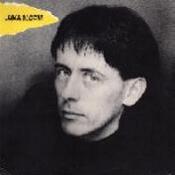 After the successful North American trip of 1987 in
which the Luka Bloom concept came to fruition, Luka
(aka Barry Moore) returned to Dublin in September of that
same year in an atternpt to put onto record what he
had achieved in America that summer. The result
was the album, simply entitled Luka Bloom, released
under the Mystery Records label in early 1988.
After the successful North American trip of 1987 in
which the Luka Bloom concept came to fruition, Luka
(aka Barry Moore) returned to Dublin in September of that
same year in an atternpt to put onto record what he
had achieved in America that summer. The result
was the album, simply entitled Luka Bloom, released
under the Mystery Records label in early 1988.
Recorded in STS Studios in Dublin, the same
studio that Luka returned to a few years later to
record The Acoustic Motorbike, the album contains
eleven tracks, three of which, "Gone To Pablo",
"Delirious" and "Over The Moon", would
later appear on his, Riverside album, albeit in a different
form. lnteresting to note is that the producer of
Motorbike, Paul Barrett, appears on this record as
well, playing keyboards. What makes this album
rather unique is that this is probably the closest you
will ever get to hear Luka playng with a band, as it
features no less than eleven other musicians, giving
the record a much more "band" sound.
Having kicked off his Barry Moore shoes and
quiet persona, Luka gets happy as "Wild Life"
begins side 1, a song made popular in his early live
shows in America. This is an anthern of sorts, to the
weekend warriors fleeing their yuppie environs to
do battle with the forces of nature, in an effort to
prove their manhood, providing of course they have
the upper hand. Live, this song was a real thriller
with its rapid-fire machine gun style guitar break,
which sadly sounds very toned down in a studio
setting, as does the overall pace of the song.
"Parisienne" another popular song at his early live
shows in New York and Washington, DC, also
appears on this album - decidedly moody and haunting,
alont the same lines of the later "You", from the Acoustic
Motorbike album. Alas, like so many good earlier
songs, it too has passed on into history.
"Gone To Pablo", "Delirious" and "Over The Moon",
well known to anyone who has ever heard Luka
play or owns a copy of Riverside, are more or less
the same as the versions on the aforementioned album,
but with one basic flaw: over-produced to the point of
being downright corny at times, and in turn, killing off
any lasting effect these songs could have on the listener,
particularly "Delirious", which features a playful but
out-of-place sax solo during each chorus, which makes
the song sound like a bad Spandau Ballet B-side.
On listening to these three tunes, one can really
appreciate Jeffrey Wood's rnasterful production on Riverside.
In comparison to those songs, however. "Second Skin" is
musically delightful. The same can be said for "lt's A Passion",
whose intro bears an uncanny resemblance to U2's
"Where The Streets Have No Name". "Little Boy" and
"The Way You Talk To Me" are two more beautiful,
rornantic ballads, in which Luka's vocals really shine.
The ethereal sounding instrumental, "Te Adoro", which
also appeared as the B-side of an early Barry Moore single
called "Out On A Limb", and has been played for the last
few years on stage as a segue between "Gone To Pablo" and
"Rescue Mission". I don't think any recorded version of this
song could ever capture the awesome presence it projects
in a live setting, but nevertheless this version is excellent, very
much in the vein of the later Japan and early David Sylvian recordings.
Hopefully, if you do get the chance to hear this album, there's
no doubt that you'll agree with my feeling that "Rodrigo Is Horne"
is by far the best song on it, and is, to say the least, a truly
magnificent piece of music, and without a shadow of a doubt
one of the man's finest moments.
Unlike In Groningen, which I reviewed in the last issue, there is
still quite a large nurnber of the cassette version of this record knocking
around, and if you search through folk music mail order houses,
you should be able to lay your hands on a copy, which is well worth
having in your collection, if not to be blown away by such wonderful
songs as "Parisienne", "Rodrigo Is Home" and
"Little Boy" then at least to compare reincarnations of the
tracks that also appeared on Riverside.
All in all, not an overly amazing debut album, especially when one considers
what a truly gifted and talented singer/songwriter Luka is, but that's not
to say it's not without some fine and memorable gems. You definitely
get the overall feeling that something unique and wonderful is about
to emerge.
Review by Steven Eccles
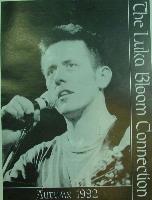
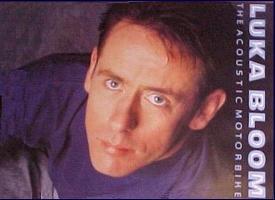
 After the successful North American trip of 1987 in
which the Luka Bloom concept came to fruition, Luka
(aka Barry Moore) returned to Dublin in September of that
same year in an atternpt to put onto record what he
had achieved in America that summer. The result
was the album, simply entitled Luka Bloom, released
under the Mystery Records label in early 1988.
After the successful North American trip of 1987 in
which the Luka Bloom concept came to fruition, Luka
(aka Barry Moore) returned to Dublin in September of that
same year in an atternpt to put onto record what he
had achieved in America that summer. The result
was the album, simply entitled Luka Bloom, released
under the Mystery Records label in early 1988.